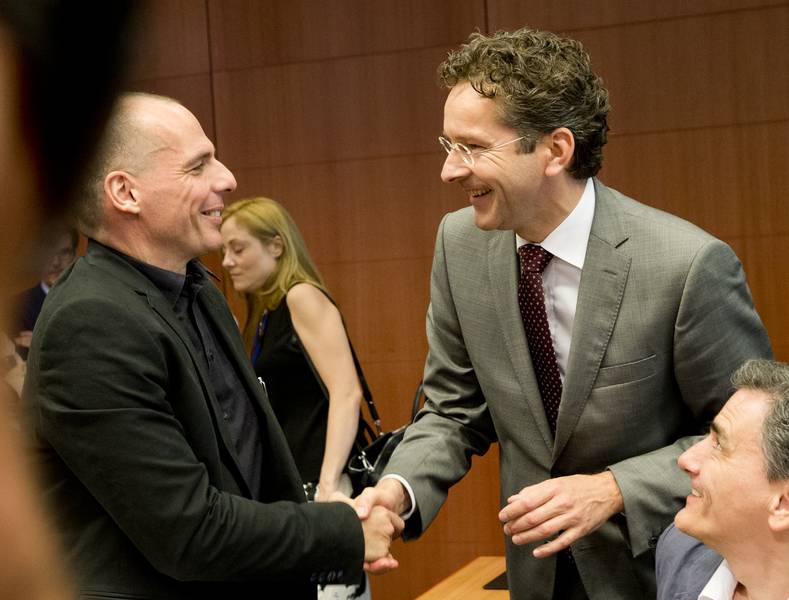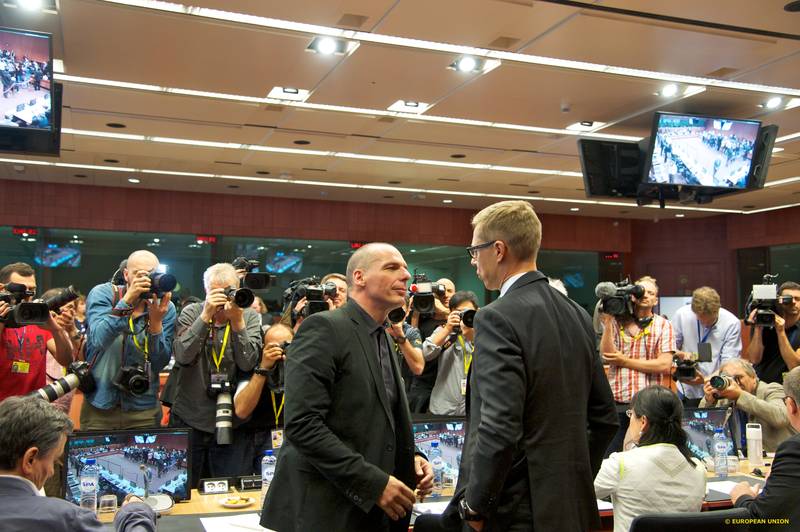Brussels, We've Got a Problem!
Adelina Marini, June 30, 2015
 For the first time since the start of the Greek crisis six years ago, or come to think of it in the entire EU history, the Union faces the exit of a member country. And totally unprecedented (if long overdue) the EU directly addresses member country voters. All of this is the direct result of the clash of mentalities – a far-right populism facing traditional, rules-based politics. A clash that will not be the last one for populism and extreme political ideology are blossoming in the EU at the moment. Greece, however, is an extremely detailed and full of pictures textbook on what happens when politics stops working for the benefit of people and lets in populism that only works for election results but is no good in ruling a country, especially one with decades of problems piled on.
For the first time since the start of the Greek crisis six years ago, or come to think of it in the entire EU history, the Union faces the exit of a member country. And totally unprecedented (if long overdue) the EU directly addresses member country voters. All of this is the direct result of the clash of mentalities – a far-right populism facing traditional, rules-based politics. A clash that will not be the last one for populism and extreme political ideology are blossoming in the EU at the moment. Greece, however, is an extremely detailed and full of pictures textbook on what happens when politics stops working for the benefit of people and lets in populism that only works for election results but is no good in ruling a country, especially one with decades of problems piled on.
Oh, that referendum!
It is not for the first time Greece has got the whole Eurozone on their toes by having a referendum, because their government is not capable of handling the truth of finally having to deal with reforms that have been postponed for decades. The first time over, however, when Georgius Papandreou did this, the whole Eurozone was at stake. Now, when Alexis Tsipras is calling a referendum, the bankruptcy of Greece is at stake and a total uncertainty as to the future of the entire Eurozone. The overly populist left government of SYRIZA kept repeating over the last few months that Greece was the cradle of democracy, that all is done in the name of democracy, and that Greece is an integral part of Europe. The referendum that the Greek Prime Minister called on Friday evening, shocking the world, is a great challenge to proving these statements.
Democracy is first of all the freedom of choice. It does, however, require full information on what is being offered. Democracy also requires time, debates, respect for the others’ point of view, a sober assessment and analyses. Alas, the Greeks are not offered as much. On Friday, June 26th, they were offered a referendum to be held less than a week later. A week, that will most probably see Greece go bankrupt as its bailout program expires on June 30th. The ECB will stop the life support of Greek banks and chaos will prevail over the country. The Greek government repeatedly refused to raise VAT and cut down government spending with the argument of this meaning cuts to wages and pensions but failed to propose options for where the money for financing the current wages and pensions is going to come from. The only place Greece can get cheap money from at the moment is the EU. However, the Union expects this to happen in exchange for a long-term commitment from the government to create a competitive economy that will no longer endanger the other 18 Eurozone partners.
In the span of just seven days the Greeks must make their own calculations and find out who’s right and who’s wrong. They are offered to approve the document which the Greek government discarded on Friday and which will not be valid after June 30th as the bailout program will have expired irreversibly. To all practical purposes what is offered to the Greek voters is choosing whether they want their country to remain in the Eurozone or not. Whether their country should go bankrupt, or be saved, but at what price? And who is going to pay the price? Seven days are far too short a term for the Greek public to be properly informed, especially keeping in mind the Greek public is suffering from the South-Eastern European illness – media is highly dependent. Precisely why one of the commitments the Greek government was making during the negotiation process was ensuring media independence.
To make a comparison, Scotland had two years to decide whether to separate itself from the United Kingdom, or remain. An extremely saturated debate, full of facts, analyses, prognoses, and expert opinions. The referendum for Scotland remaining in Great Britain was an example of European democracy. Democracy, whose beginning was set by the Magna Carta that marked its 800 year anniversary this year. It was on this occasion that the British ambassador in Zagreb reminded that the democracy of the time (the one born of the Magna Carta) did not meet the Organization For Security And Co-operation In Europe’s criteria. This gives full validity to the question whether the democracy that Greece prides itself with and is supposedly in the foundation of European culture and history is good enough for OSCE standards. And what about contemporary Greek democracy?
Democracy has evolved quite a bit over the last hundred years in Europe, however quite unevenly, like economy. There are huge discrepancies of democracy levels visible in the EU today. Some have advanced after a natural evolutionary process, others have tried successfully to implant democracy after long years of dictatorships, and yet others are still struggling. Where is Greece? Which group is it in? These are important questions and the time for answers is now.
Brussels, do you read me?
Events like today's with Greece are a historic rarity that demands strong leadership. The EU had been long accused of not showing one but the developments over the last few months have shown otherwise. The Eurogroup boss and minister of finance of The Netherlands fought tirelessly to keep Greece in the Eurozone, while at the same time keeping the currency block from demoralizing over an unfair deal. Many Eurozone and EU member countries have at one point in time weathered heavy economic crises but in the name of shared sovereignty have undertaken heavy reforms and paid a stiff social and political price. This is exactly what the leader of the European Commission and European politics veteran Jean-Claude Juncker reminded today in an unprecedented speech, fully targeted at the Greek people with a plea to vote for staying in the Eurozone.
Both him and Jeroen Dijsselbloem have finally shown with their behaviour that this saga cannot go on forever. Greece is really facing a decision of a lifetime. If it chooses to stay in the Eurozone it must go through a painful process of actual re-accession – a full economic and political transformation. The EU is prepared to pay the price. This means that countries with lower income per capita than Greece and fragile democracies are also prepared to help Greece once more provided this finally proves to be the long-awaited solution to the Greek problem. If, however, Greece chooses exiting the Eurozone and the EU, dark times and a new portion of dictatorship and unrest await.
The problem, however, is that Greece is not the only state where populism in the entire political spectrum – from far right to far left – blossom. All of them neglect the key problem which is political responsibility. Delaying reforms for years leads to economic hardships, which are the perfect breeding ground for selling easy remedies. According to Jeroen Dijsselbloem, there are no easy programs. We, in Eastern Europe, know that only too well. Greece as well as many other countries are facing a similar choice – continuing on with shared sovereignty and finally taking responsibility not only to our parties and voters but people of the other member countries as well, or return to a well-known nation-state sovereignty and opening wide the gates for repeating 20th century history.
Shared sovereignty requires shared politics. The first step towards the Europisation of politics was made at the European elections last year, when for the first time the boss of the EC was elected in an open campaign. This is why today he had the full right to claim the negotiations with Greece were not conducted by unelected euroclerks and bureaucrats but by an elected by the European Parliament politician and a winner of national elections member of the Council (Jeroen Dijsselbloem). Today the EC boss made the second step by voicing a strong plea to the Greek people. “In a democracy - and the Greek democracy has the absolute right to put this question for referendum - the absolute right in  democracy is to ask people to give their advice. Every citizen deserves the whole story and the truth and they have to know that - on our side - the door is still open”, pleaded Mr Juncker.
democracy is to ask people to give their advice. Every citizen deserves the whole story and the truth and they have to know that - on our side - the door is still open”, pleaded Mr Juncker.
He added that it was high time Greek political leaders stood up to their responsibility and told their people what is at stake and that it is not going to be easy, as others have done. “Ask the Irish, Portuguese, Spaniards, and many others. Now is the moment of truth”, concluded the European veteran. A plea to the Greek people to vote “Yes” made also the boss of European Parliament Martin Schultz after an emergency meeting of the Conference of Presidents. Italian Prime Minister Matteo Renzi posted on Twitter: “The point is: Greek referendum won't be a derby EU Commission vs Tsipras, but euro vs drachma. This is the choice.”
All things said the current political crisis has its good side. It uncovered the true face of populism and showed easy promises turn out costly. Besides, there was tension in the Eurozone for awhile. Now is the time to give a clear sign that the EU can function only if everyone follows the rules. This is exactly why the current situation gives excellent possibility for re-starting the debate on the meaning of the EU and the Eurozone in particular with full debate and arguments as needed. This is the only way to undermine the populists’ theses and in the mean time evaluate mistakes made so far. However, those mistakes can no longer be sought at just the national level; neither can a finger be pointed at Brussels alone. Politics has ran too late at exiting outside the national level. It is high time for a change, and we should be thankful to Greece for showing us how important it is to know this.
It is a fateful moment for the EU as much as it is for Greece. Telling the truth is important not only for Greek politicians. Truth has been veiled elsewhere as well with the ready excuse “Brussels says”. The way the EU exits this first serious existential crisis will serve as a model for the next crisis, imminent to come with the next populist government.
Translated by Stanimir Stoev
 Klaus Regling | © Council of the EU
Klaus Regling | © Council of the EU Mario Centeno | © Council of the EU
Mario Centeno | © Council of the EU Mario Centeno | © Council of the EU
Mario Centeno | © Council of the EU